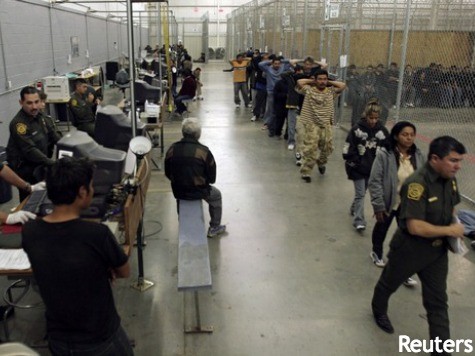HOUSTON, Texas–Breitbart Texas exposed that the federal government is shifting illegal immigrant children from federal facility to federal facility in order to avoid state agency interference. Darby’s exposure of photos of illegal immigrant children arriving from Central America and crossing the border has created a national tsunami over the last several weeks. The photos show children warehoused and essentially sleeping on top of one another. Children as young as infants, and as old as teenagers, are being watched by U.S. Border Patrol agents. There are legal actions that the State of Texas and others can take to protect these children. The question is whether Child Protective Services (CPS) would do any better than it did when the nation watched the agency handle the Fundamentalist Church of Jesus Christ of Latter-Day Saints (FLDS) case in the spring of 2008–and whether the state is equipped to deal with the problem.
The State of Texas, via the Texas Department of Family and Protective Services (TDFPS), can intervene in this federally-created human rights catastrophe. An individual with personal knowledge of abuse or neglect can make a complaint by calling the CPS hotline. Texas state law requires TDFPS (also referred to as “CPS”) to investigate all reports of abuse or neglect of children within the borders of Texas. Its jurisdiction is not limited to children who are Texas or United States citizens.
CPS investigates a situation after a complaint is filed. If the situation is an emergency, a child can be taken by the Department without court order. Most situations constitutionally require a court order. TDFPS then works with the caregiver to develop a “Safety Plan.” If removal of the child is necessary, the Department places the child with relatives or in licensed facilities or licensed foster homes. TDFPS is charged with licensing and monitoring childcare facilities and foster homes.
CPS can also file for a legal injunction against the federal agencies involved. The federal government, like state government, has sovereign immunity. The issue of federal sovereign immunity can be avoided by asking for injunctive relief. TDFPS can file a federal section 1983 civil rights action and ask a court to enjoin these agencies from violating these children’s civil rights.
An individual could also file a Qui tam action. Qui tam is short for qui tam pro domino rege quam pro se ipso in hac parte sequitur, meaning “[he] who sues in this matter for the king as well as for himself.” A person must have legal standing to sue but these actions have been used in Medicaid fraud suits and suits where contractors with the federal government are committing fraud. A person with personal knowledge has standing to sue. Qui tam actions are kept under seal to protect the person who filed the lawsuit. The government can intervene and seek discovery of pertinent information.
But is CPS equipped to intervene to take care of these children? Does the state have the financial resources to house these illegal immigrant children who are flooding into Texas? How did it handle the FLDS case?
TDFPS received a complaint in late March of 2008 alleging physical and sexual abuse of a female child at the Yearning for Zion Ranch. The ranch housed members of the Fundamentalist Church of Jesus Christ of Latter Day Saints (FLDS). It was located near Eldorado, Texas and members of the church were accused of marrying and impregnating child brides. Some of the men were later convicted.
The FLDS case was one of the most complex child custody cases in history. There were 439 children who got caught up in the state system. The issue was whether CPS handled the situation properly, or overreached its authority by removing all of the children without assessing the immediate danger of each child removed. The Texas Supreme Court ruled that the Department did not handle the situation lawfully. Thirty-eight of the mothers had petitioned the court of appeals seeking return of their 126 children.
The Texas Supreme Court agreed with the intermediate appellate court and wrote that the Department “argue[d] without explanation” that the decision of the court of appeals left the Department unable to protect the children. The Court opined that the Texas Family Code gives the district court broad authority to protect children and make and modify temporary orders “for the safety and welfare of the child.” The Court noted that the Family Code prohibits interference with an investigation, and a person who relocates a residence or conceals a child with the intent to interfere with an investigation commits an offense.
The Texas Supreme Court held that CPS did not handle the removal of the FLDS children in a lawful way. Would these children receive adequate care if the Department removed them in the procedurally correct way? Breitbart Texas’ border security expert Sylvia Longmire wrote an article today that postulates that there are foreign unaccompanied children who receive better treatment than children in U.S. foster care.
Lana Shadwick is a former family law associate judge and former TDFPS lawyer.

COMMENTS
Please let us know if you're having issues with commenting.